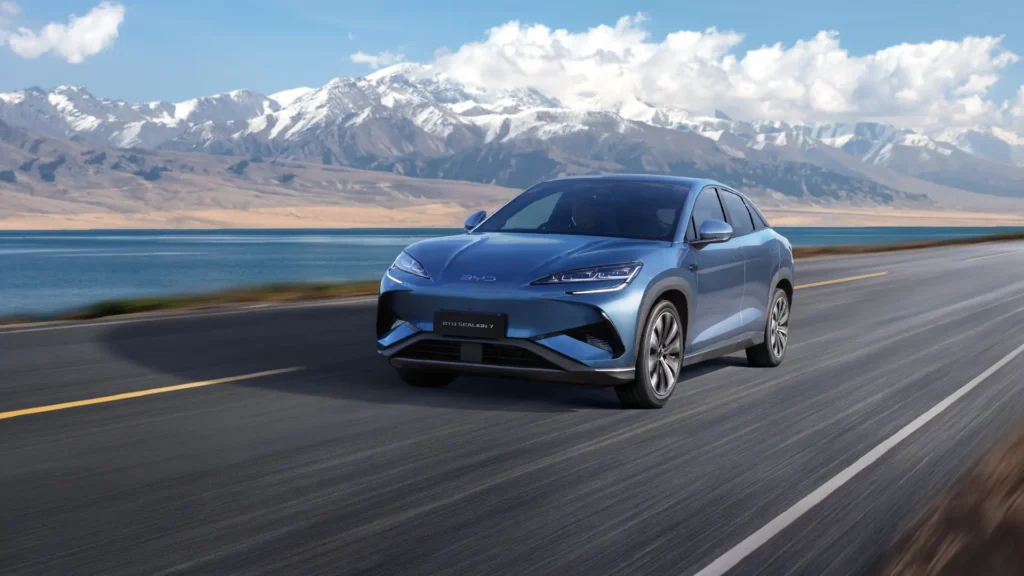Chinese electric vehicle giant BYD is set to transform India’s EV landscape. The company is preparing to establish its first BYD India EV factory near Hyderabad, Telangana. This marks Telangana as the first Indian state to host a BYD production unit. After extensive talks, the state government has pledged full support, including land allocation, making this a landmark move for India’s EV sector.
Telangana’s Push for BYD
The Telangana government is rolling out the red carpet. It has proposed three potential sites near Hyderabad, which BYD representatives are currently evaluating. A final decision is imminent, with an agreement expected soon after. If this BYD India EV factory takes off, Telangana could secure a staggering Rs 85,000 crore ($10 billion) investment—one of the largest private-sector EV projects in India. Beyond the factory, ancillary industries for EV components could sprout, creating an automotive cluster around Hyderabad, per Business Standard.
Why Hyderabad? A Strategic Choice
BYD’s choice isn’t random. The company has a decade-long partnership with Hyderabad-based Olectra Greentech, an MEIL subsidiary. Since 2013, Olectra has produced electric buses using BYD tech, supplying them nationwide. This collaboration likely tipped the scales for Telangana. Plus, the state’s EV policy—offering road tax exemptions until 2026—sweetens the deal, positioning Hyderabad as a potential EV hub akin to Tamil Nadu’s auto clusters.
Overcoming Past Hurdles
BYD’s India journey hasn’t been smooth. For two years, it’s eyed a local plant. In 2023, a $1 billion joint venture with MEIL (Rs 8,200 crore) was rejected by the Indian government over Chinese investment curbs, post-2020 Galwan tensions. Submitted to the Commerce Ministry and reviewed by Heavy Industries, External Affairs, and Home Affairs, it hit a wall. Recent policy shifts have eased these restrictions, with the Union Home Ministry reportedly signaling “no objection,” though full central approval is pending, per reports. This green light has revived BYD’s BYD India EV factory plans.
From Imports to Local Powerhouse

BYD currently imports EVs like the Atto 3 (Rs 24.99 lakh), Seal, and eMax 7 from China. High import duties—up to 100%—inflate prices, capping market share. Local production could cut costs by 25-30%, boosting competitiveness against Tata Motors and Mahindra. As per reports, the BYD India EV factory will span 500 acres, targeting 600,000 EVs annually by 2032. Here’s the breakdown:
| Facility | Details |
|---|---|
| EV Production | 600,000 units/year by 2032 |
| Battery Plant | 20 GWh capacity |
| Investment | Rs 85,000 crore ($10 billion) |
| Land Area | 500 acres |
Battery Production and Tech Edge
Beyond assembly, BYD plans a 20-gigawatt-hour (GWh) battery plant. This could slash India’s reliance on imported cells, mostly from China. Featuring BYD’s Blade Battery (LFP)—known for safety and efficiency—it offers a range edge over rivals. Globally, BYD’s testing a 1 MW flash charger, delivering a 400 km range in 5-8 minutes. If introduced at the BYD India EV factory, it could redefine EV adoption here.
BYD vs. Tesla: The India Race
BYD’s move outpaces Tesla, which is still exploring contract manufacturing in India. In 2024, BYD posted $107 billion in revenue (Rs 9.20 trillion), edging out Tesla’s $97.7 billion (Rs 8.40 trillion). BYD delivered 4.27 million vehicles (EVs and hybrids) vs. Tesla’s 1.79 million EVs. The Hyderabad plant gives BYD a first-mover advantage, with exports planned to Southeast Asia.
Market Impact and Jobs
India’s EV market is booming—1.9 million registrations in 2024. The BYD India EV factory could claim 15% of this by 2028, per analysts. It’ll create thousands of jobs and foster an EV ecosystem, from components to charging networks. Telangana’s central location aids nationwide distribution.
Expansion Plans and Beyond
BYD’s ambitions don’t stop here. The Rs 85,000 crore investment may roll out in phases, with the battery plant reducing import costs. While past X posts doubted the project due to geopolitical tensions, recent progress—BYD reps scouting sites—shows momentum. The factory aligns with India’s 2030 EV goal of 10 million annual sales (NITI Aayog), challenging Tesla and local players alike.
Final Charge
The BYD India EV factory near Hyderabad is a game-changer. With Telangana’s backing, cutting-edge tech, and a massive scale, BYD is poised to electrify India’s roads. Will it spark an EV revolution? Stay tuned as this unfolds.
Also Read: Upcoming Electric Vehicles in India 2025: Top EVs to Watch




